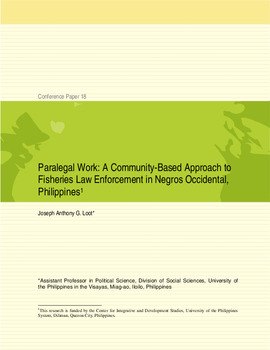Paralegal work: a community-based approach to fisheries law enforcement ni Negros Occidental, Philippines
Abstract
The depletion and degradation of the State marine and aquatic resources due to uncontrolled exploitation are the primary reasons for the enactment of fisheries laws. There are two approaches to the enforcement of these laws. Traditional law enforcement involves the intervention or actual performance by government through its designated and deputized agents. However, government activities are directed mainly at preventing further resource depletion. This is a shortcoming that prompted the conduct of alternative law enforcement strategies aimed at resource development. Paralegalism is a concept that pursues developmental legal aid, which is provided for the poor and marginalized sectors of society, such as a fishing community. This aid is provided by paralegals who are non-lawyers but with sufficient understanding of the law after having undertaken paralegal training. In coordination with the local government unit, non-governmental organizations conduct paralegal activities in the community. The residents undergo paralegal training, which includes education on the substantive and procedural aspects of the fisheries laws. The empowerment of community residents prompts them to initiate or participate in the apprehension and litigation of fisheries law offenders. The community involvement manifests the social acceptability of paralegal work. On the other hand, financial and/or logistical support is provided by the local government unit. This expresses its political acceptability to paralegal work in the community. The acceptability of both the community and the local government unit are indicators for determining effectiveness of paralegal work as a community based approach to fisheries law enforcement

